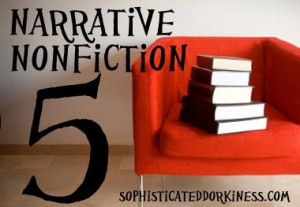 I’m in the middle of reading The Long Goodbye by Meaghan O’Rourke, the story of O’Rourke’s experiences after her mother’s death from at age 55. While I don’t actively seek out memoirs about grief, it seems like they have been a big part of my reading lately.
I’m in the middle of reading The Long Goodbye by Meaghan O’Rourke, the story of O’Rourke’s experiences after her mother’s death from at age 55. While I don’t actively seek out memoirs about grief, it seems like they have been a big part of my reading lately.
About a month ago, I read an article in the New York Times where O’Rourke and Joyce Carol Oates discuss why they chose to write about their own losses, and why books about loss can resonate with readers.
Although the article gives a list of books within the “grieving memoirs” category, I’d already started working on this list and it felt a shame to let it go. Grief is an experience that is, I think, tough to talk about. The authors of each of these memoirs — all women, by just coincidence — explore grief in different but, I hope, equally powerful ways.
The Year of Magical Thinking by Joan Didion
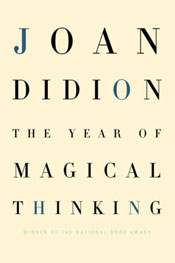 Joan Didion’s account of the year after her husband, John Dunne, unexpectedly passed away is the first memoir of loss that I’d ever read. When I picked it up, I was apprehensive — it seemed like it could be too much sadness for me at that point. Yet when I finished, I immediately wanted to read it over again. As I wrote in my review,
Joan Didion’s account of the year after her husband, John Dunne, unexpectedly passed away is the first memoir of loss that I’d ever read. When I picked it up, I was apprehensive — it seemed like it could be too much sadness for me at that point. Yet when I finished, I immediately wanted to read it over again. As I wrote in my review,
I guess my point is to not go into this book thinking that it’s going to be easy. It’s absolutely worth it — this was a fantastic book — but it can be emotionally difficult to read.
Didion is a powerful, specific, and beautiful writer, and I think The Year of Magical Thinking is not to be missed.
A Widow’s Story by Joyce Carol Oates
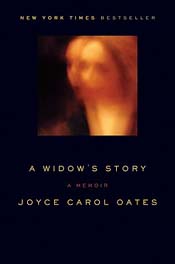 All of the reviews that I’ve read of A Widow’s Story inevitably compare it to The Year of Magical Thinking, probably because both cover the same topic — a wife grieving in the year after her husband’s death. Yet as Ron Hogan noted in his review in Shelf Awareness, “The power of this memoir, then, is not in the originality of Oates’s experience but in the extent to which she opens her life up to readers.”
All of the reviews that I’ve read of A Widow’s Story inevitably compare it to The Year of Magical Thinking, probably because both cover the same topic — a wife grieving in the year after her husband’s death. Yet as Ron Hogan noted in his review in Shelf Awareness, “The power of this memoir, then, is not in the originality of Oates’s experience but in the extent to which she opens her life up to readers.”
There’s also been some criticism of the fact that Oates does not disclose that 11 months after her husband’s death, she was engaged. Readers, most notably Janet Maslin in the New York Times, felt betrayed by that omission of that information. Having not yet read the book I can’t necessarily comment, other than to say that Oates is one of my favorite writers and I plan to read this memoir sometime in the future.
Let’s Take the Long Way Home by Gail Caldwell
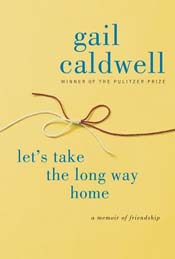 While the subtitle of Let’s Take the Long Way Home is “a memoir of friendship,” I think Gail Caldwell’s memoir about her friendship with author Caroline Knapp fits on this list because, in the end, much of the book focuses on how Caldwell copes with the loss of her best friend and companion.
While the subtitle of Let’s Take the Long Way Home is “a memoir of friendship,” I think Gail Caldwell’s memoir about her friendship with author Caroline Knapp fits on this list because, in the end, much of the book focuses on how Caldwell copes with the loss of her best friend and companion.
Caldwell and Knapp met over their dogs, running into each other at a local dog park after a friend suggested they may get along. Over the next several years, the two private, independent writers forged a bond that was pretty remarkable. Throughout, Caldwell’s writing is fluid and lovely, and if you don’t look for more in memoirs than a good story, this is a great read.
History of a Suicide by Jill Bialosky
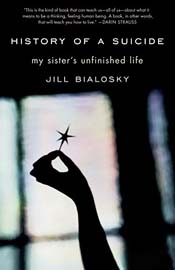 When I read the summary of History of a Suicide, my heart dropped a little bit because it sounds so unspeakably sad. In 1990, Jill Bialosky’s younger sister, Kim, came home from a bar, fought with her boyfriend, then committed suicide in the family’s garage.
When I read the summary of History of a Suicide, my heart dropped a little bit because it sounds so unspeakably sad. In 1990, Jill Bialosky’s younger sister, Kim, came home from a bar, fought with her boyfriend, then committed suicide in the family’s garage.
For 20 years, Bialosky has lived with grief from that event. In the book, Bialosky uses her sister’s diary, combined with family history and research about suicide, to try and figure out what happened. This book was just released last month, but I hadn’t heard of it until I put this list together. It sounds like a fascinating book on a subject that frankly, I’ve never read much about.
An Exact Replica of a Figment of My Imagination by Elizabeth McCraken
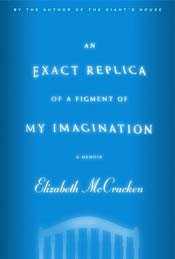 In her 30s, Elizabeth McCracken was a successful novelist, unencumbered and a self-proclaimed spinster. But then she fell in love, got married, and moved to a remote part of France to await the birth of her first child. In the ninth month, McCracken learned that the baby was dead. This memoir is the story of recovering from that loss. I don’t know much more about An Exact Replica of a Figment of My Imagination, but it sounds powerful.
In her 30s, Elizabeth McCracken was a successful novelist, unencumbered and a self-proclaimed spinster. But then she fell in love, got married, and moved to a remote part of France to await the birth of her first child. In the ninth month, McCracken learned that the baby was dead. This memoir is the story of recovering from that loss. I don’t know much more about An Exact Replica of a Figment of My Imagination, but it sounds powerful.

Comments on this entry are closed.
I love a good memoir, but don’t think this is the right time for me to read about grief.
bermudaonion: I think you have to be in the right mood for grief memoirs. They can be hard to read.
Of these, I’ve only read Didion’s memoir, but I do remember it being rather moving without being overly maudlin (and I was worried about that too). Tough subject though.
Trisha: Didion’s memoir is the only one I’ve read as well, and really loved it.
I really want to read that last one. I’ve read The Giant’s House by Elizabeth McCracken and while I didn’t love some of the plot choices she made, the writing is gorgeous.
Lu: That’s really good to hear — good writing makes me so happy, especially in books that are hard to read.
My grandmother had a copy of The Year of Magical Thinking when I was visiting her a last year and I almost picked it up… but I really thought it would be too depressing. Maybe I should try it though.
Kate: I was very worried it would be too depressing too, but I didn’t feel like that when I read it. Parts were very sad, but not depressing, if that makes sense 🙂
I find it hard to read nonfiction about grief if I’m not grieving. Maybe it’s the details of the particular experience, because I don’t find it hard at all to feel the grief of dramatic tragedy or poetic despair even if I’m in a perfectly sunny mood going into it.
Jeanne: That’s what I’ve been feeling about The Long Goodbye. It’s a good book, but I think it needs to be read in a certain mood. I wasn’t grieving when I read The Year of Magical Thinking, but I was definitely in the mood for that sort of book.
I just added An Exact Replica and History of a Suicide to my library hold requests! Thank you for these, Kim 🙂
Lynne: Great, I hope you enjoy it (and will blog about it — I’m curious to hear what people think!)
The Year of Magical Thinking is one of my all time favorite books! I’ve yet to read anything by Joyce Carol Oates though, so maybe A Widow’s Story would be a good next step for me.
Ash: I think A Widow’s Story would be a good next book. I’ve read Oates’ fiction, but no nonfiction. Her writing style in fiction is really lush and beautiful.
The Elizabeth McCracken is very good indeed — though really, really sad of course. I read it a few years ago, in a bookstore, and I didn’t think I’d get farther in than a few pages. McCracken has an interesting, unusual style of writing, as it turns out, and I couldn’t stop reading. I hope you like it!
Jenny: That’s good to hear, I’m glad it’s so good. The reviews I read of it mentioned the beautiful writing, which is great.
I have The Year of Magical Thinking, but I’ve been reluctant to read it for fear it’ll be too tough to get through. I’m glad to hear it’s worth it, though.
Erin: I didn’t think it was too tough to get through, it’s certainly sad, but not depressing, which is an odd but important distinction.
The last two really intrigue me – I’ve heard of McCracken’s book before, at least I knew its topic, though I couldn’t remember its title.
Christy: I hadn’t heard of the last two before starting to do some research for this list, but they sound like they’ll be good to me.
I haven’t read any of these, perhaps because I’m afraid of the sadness. But these all sound so interesting. My daughter had two friends that died within a month of each other, one by her own hand, and six months later she will just burst into tears thinking of them. I can’t imagine how hard it would be to read a book about a sister’s suicide.
Lisa: Wow, that’s such a sad story, I’m sorry to hear about your daughter’s friends. I think that book will be hard to read, but it sounds like it could be good.
I just finished A Widow’s Story and read all of the books listed above within the last year or so. They were all wonderful (if you can say that regarding a book about grief). Thanks for posting this article!